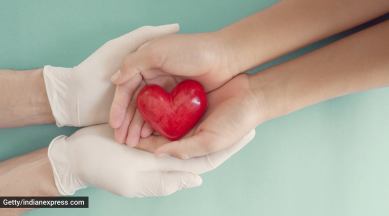📣 For more lifestyle news, click here to join our WhatsApp Channel and also follow us on Instagram
Organ Donation Day 2021: How organ donation has changed in the pandemic
"Organ transplants are often the last chance at survival for a few and matched organs are difficult to come by," said Dr Avnish Seth, Principal Director, Gastroenterology and Hepatobiliary Sciences, Director, Transplant Hepatology and Fortis Organ Retrieval & Transplant (FORT)

The emergence and spread of Covid-19 has brought great challenges to the healthcare system. While the country has lost hundreds of thousands to the illness, the effect on those suffering from non-Covid illnesses has been equally profound.
“With the advent of Covid-19 in early 2020, hospital resources were channelised towards treatment of infected patients, and donation and transplantation of organs and tissues were placed on hold. As coronavirus cases surged, states ordered hospitals to suspend non-urgent and elective surgeries to preserve resources and limit the number of people who could be exposed to the virus. Under these new rules, transplant programs posed an ethical quandary for hospitals,” said Dr Avnish Seth, principal director, gastroenterology and hepatobiliary sciences, director, transplant hepatology and Fortis Organ Retrieval & Transplant (FORT).
He added that organ transplants are often the “last chance at survival for a few and matched organs are difficult to come by”. At the same time, transplants are among the most complex surgeries performed in hospitals, utilising many of the same resources and in some cases the same ICU doctors needed in Covid-19 units.
“As we learnt to cope with the virus, Covid-free protocols evolved around the world and transplant activity resumed. In India, too, living donor-based kidney and transplant programs have resumed with full vigor. However, the deceased donor-based donation and transplant of heart, lungs, kidneys, liver, pancreas, and small intestine have taken a hit because of the pandemic. In the year 2019, we had over 800 deceased organ donors in India leading to life saving transplantation of hundreds of patients. In 2021-21, deceased organ donations have decreased by 50-80 per cent across the world and our country has been similarly affected,” he told indianexpress.com.
It must be noted that the wait for a donated organ can be agonizing and while some patients stand by months or years, some others never live to find a match and “the coronavirus pandemic has made the wait all the more intense”. Travel restrictions across states has severely affected movement of deceased organs for transplantation into those that need them most.
“For the thousands who keep waiting for that magical phone call telling them that an organ has been allotted to them, the wait may have become excruciatingly longer. As transplant teams saw hundreds of patients losing their battle while waiting for organ transplantation, the importance benefit-risk ratio stood out in stark reality. Both transplant patients and deceased organ donors must test negative for Covid-19, a step that can delay a time-sensitive procedure, but one that doctors have deemed a critical precaution. Although hospitals do their best to meet the needs of transplant patients, they also face challenges that no amount of planning or strategising can resolve. Patients must come alone and stay at the hospital no longer than is absolutely necessary,” he stressed.
He further said there have been concerns that organ transplant recipients who are on medications that reduce body immunity, may be more prone to infection with Covid-19 or have a more severe course of illness.
“It has now been consistently shown that use of majority of these medications is safe and may actually prevent severe symptoms by blocking the cytokine storm and that the outcome of the Covid-19 infection is the same if not better in organ transplant recipients. It is no surprise that after initial apprehensions, transplant activity has resumed in the country as Covid-free pathways have been established,” he said.
When so much is at stake, “Covid or no Covid, the show must go on.”
📣 For more lifestyle news, click here to join our WhatsApp Channel and also follow us on Instagram